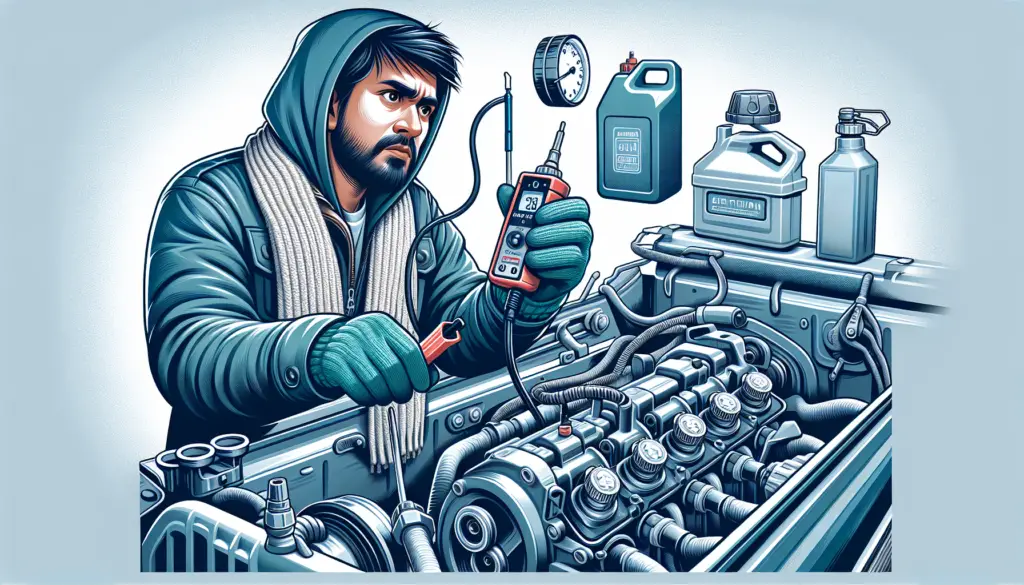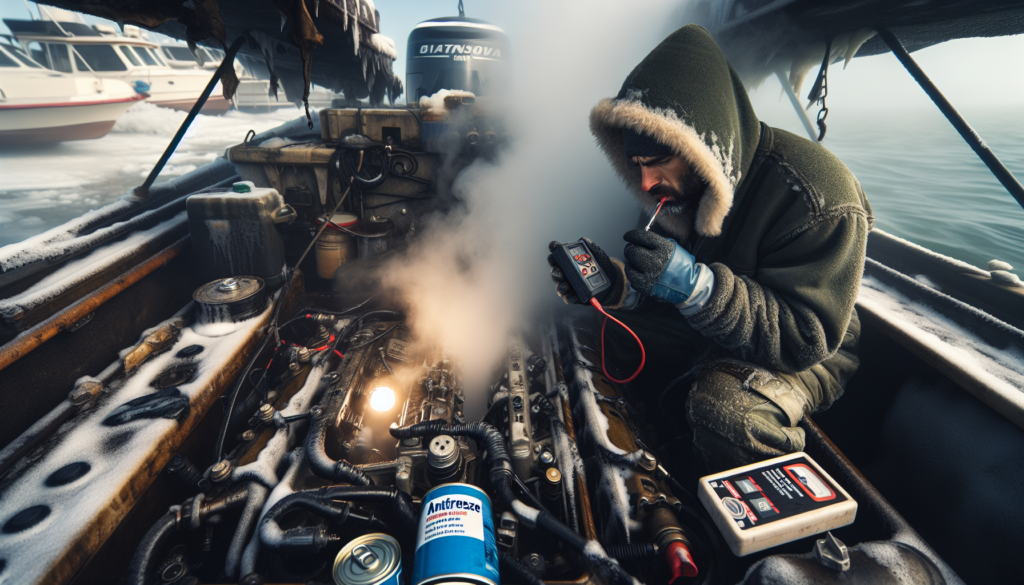As someone who savors the freedom and adventure of boating, winter doesn’t have to put a freeze on your maritime fun. However, colder weather can create some unique maintenance challenges for your boat, especially when it comes to your engine. “How to Keep Your Boat Engine Running Smoothly in Cold Weather” offers you invaluable tips on winterizing your boat’s engine, tips on proper boat storage, and guidelines on how to protect it from the possible damage that harsh weather conditions can bring. This is your handy guide to navigating the chilly waters of boat engine maintenance during winter. So, let’s set sail and explore the ways to keep your engine humming along, even when the temperature drops!

Understanding the Challenges of Cold Weather for Boat Engine
Navigating the chilly waters during the winter season can be an exciting experience. However, cold weather can also present several challenges for your boat’s engine.
Effects of cold weather on boat engines
First off, lower temperatures can lead to various effects on your boat’s engine. Cold condenses the engine’s oil, making it thicker and less efficient in lubricating the engine parts. Furthermore, cold weather can make the fuel ineffective, increasing the likelihood of engine problems. Freezing temperatures can also cause the water in the engine to freeze, leading to cracked or broken pipes due to expansion.
Importance of proper engine maintenance in cold weather
Proper engine maintenance in cold weather is paramount because it helps to prevent the adverse effects that cold weather may have on your boat engine. It can prevent costly repairs and extend the life of the boat engine. Ignoring maintenance during the cold weather may lead to severe engine issues that can interfere with your boat’s overall performance.
Preparing Your Boat Engine for Cold Weather
Proactive measures are better than reactive. Get your boat engine prepared for the icy winter weather before it sets in.
Checking the condition of your engine
Regular inspection allows you to ensure your engine is at its peak performance. Keep a check on the oil levels, inspect the engine’s air filter, and ensure that the spark plugs are in good condition. Monitoring these conditions helps you identify any issue before it becomes severe.
Identifying potential issues in cold weather
Head off potential problems by being aware of the common cold-weather issues for boat engines. Some common issues include thickened oil, batteries draining faster, fuel condensation, and freezing water within the engine.
Practicing routine maintenance
Take care of your engine by adhering to a routine maintenance schedule. This includes changing the oil, antifreeze, replacing filters, and checking the fuel system. Routine maintenance can help prevent unexpected breakdowns and prepare your engine for the cold months ahead.
Winterizing Your Boat Engine
Winterizing your boat engine is a crucial step to ensure its longevity and optimum performance during cold weather.
Steps to winterize a boat engine
Winterizing involves various steps like draining water from the engine and replacing it with antifreeze, changing the oil, and removing the battery for storage. It’s a procedure aimed at protecting your engine during the harsh winter season.
Materials needed for winterizing
You will need several things to winterize your boat correctly. They may include a winterizing kit, oil, antifreeze, boat cover, and tools for disassembly.
Importance of winterizing a boat engine
Winterizing can significantly increase the lifespan of your boat’s engine. It also ensures that your boat engine doesn’t get damaged due to harsh weather conditions. Winterizing helps prevent freezing, corrosion, and engine break down.

Using the Right Oil for Cold Weather
Your boat engine will need a different oil type during cold weather.
Types of oil suitable for cold weather
Oils with lower viscosity flow better in cold conditions. Look for a multi-viscosity oil that remains thin in cold weather but can protect your engine even when the temperature increases.
How to change oil for cold weather
Changing oil for cold weather involves draining out the old oil, changing the oil filter and filling up with new oil suitable for colder conditions. Consult your engine’s manual for specific details about oil change intervals.
Effect of oil viscosity on engine performance
Oil viscosity plays a significant role in your engine’s performance. The right oil viscosity ensures that the engine parts move smoothly, reducing wear and tear, and enhancing efficiency. A too thick oil (high viscosity) could be hard to circulate in cold weather, while too thin oil (low viscosity) may not adequately protect the engine in hot conditions.
Importance of Battery Maintenance in Cold Weather
Batteries are also significantly affected by cold weather, so maintaining them becomes even more critical.
How cold weather affects boat batteries
Cold weather reduces the capacity of your boat’s batteries and makes them drain faster. The chemical reactions in the battery slow down, reducing the power it can deliver.
Tips for maintaining batteries in cold weather
To maintain your battery, regularly check the charge and electrolyte levels. Keep them clean, dry, and free from corrosion. A battery charger can also help maintain the charge during the winter months to ensure it is ready for use.
Opting for a marine battery for durability in cold
Choose a marine battery designed to withstand cold temperatures. Marine batteries have a durable design and enhanced capacity to keep your boat powered even in cold weather.
Fuel Management During Cold Weather
Fuel management is another crucial aspect that can help keep your engine running smoothly in cold weather.
Why fuel management is critical
Proper fuel management can prevent fuel condensation, contamination, and it ensures that your engine gets the required power for optimum performance.
Choosing the right fuel for cold weather
Different fuels perform differently in cold weather. Always use fuel that is recommended for your particular boat engine. Also, consider using fuel additives that can help prevent fuel from freezing or gelling in low temperatures.
Avoiding fuel condensation and contamination
Store your boat with a full tank of gas to avoid condensation that could lead to contamination. If water gets into your fuel, it can freeze and damage your engine.
Controlling Moisture Level in the Boat Engine
Moisture can cause significant issues for your boat’s engine.
Effect of moisture on boat engines
Moisture can lead to corrosion and rusting of engine parts. Moreover, when moisture freezes, it can cause your engine to crack.
Tips to prevent moisture build-up
To prevent moisture buildup, cover your boat well and ventilate it adequately. Using a moisture absorber or dehumidifier can also help keep moisture levels down.
Using engine dehumidifiers
A dehumidifier can help remove any excess humidity within the boat’s engine room, thus protecting it from harmful effects of excess moisture.
Keeping the Propeller in Check
Your propeller needs maintenance too.
Periodic inspection of propellers
Check your propeller regularly for any signs of damage or wear and tear. A damaged propeller can result in decreased engine performance and speed.
Proper propeller maintenance tips
Clean the propeller regularly and remove any debris caught in it. Minor damages can be fixed, but it is better to replace severely damaged propellers.
Replacing propellers if necessary
If there are heavy nicks or if the propeller is bent, you should have it replaced. Make sure you pick a propeller that suits your engine’s specifications and expected use.
The Role of Antifreeze in Cold Weather
Antifreeze plays an essential role in keeping your boat engine running smoothly in cold weather.
Why use antifreeze?
Antifreeze protects your boat’s engine from freezing temperatures. It keeps the water in your engine from freezing, which could cause cracks or damages to the engine.
Proper way to use antifreeze in boat engines
Fill the engine block with antifreeze, ensuring that all the parts of the system that contain water get protection from freezing. Use an antifreeze that is made for marine engines to ensure compatibility and protection.
Risks of not using antifreeze during cold seasons
By not using antifreeze, you risk your engine freezing and subsequently getting damaged. The damages resulting from freezing can be extensive and costly to repair.
Proper Storage Options for Boats in Cold Weather
Where and how you store your boat in winter can impact your engine’s performance after the cold season.
Considering an indoor storage facility
Indoor storage can protect your boat from harsh weather, ensuring that the cold does not affect the engine, battery, and other parts of the boat.
Using boat covers for outdoor winter storage
If indoor storage isn’t an option, sturdy boat covers can protect your vessel from snow and ice. A good boat cover prevents moisture buildup inside the boat, which could lead to rust and corrosion.
Checks to perform before storage
Before storing, make sure all components are in good condition and the boat is cleaned. Filling up the gas tank, disconnecting batteries, and drying out the boat can help ensure the boat stays in good shape during storage.
In conclusion, while cold weather can pose challenges for your boat engine, proper preparation and maintenance can help your boat engine run smoothly during this time. These practices will not only ensure your boat performs well in cold weather but will also contribute to the overall longevity of your boat’s engine.

